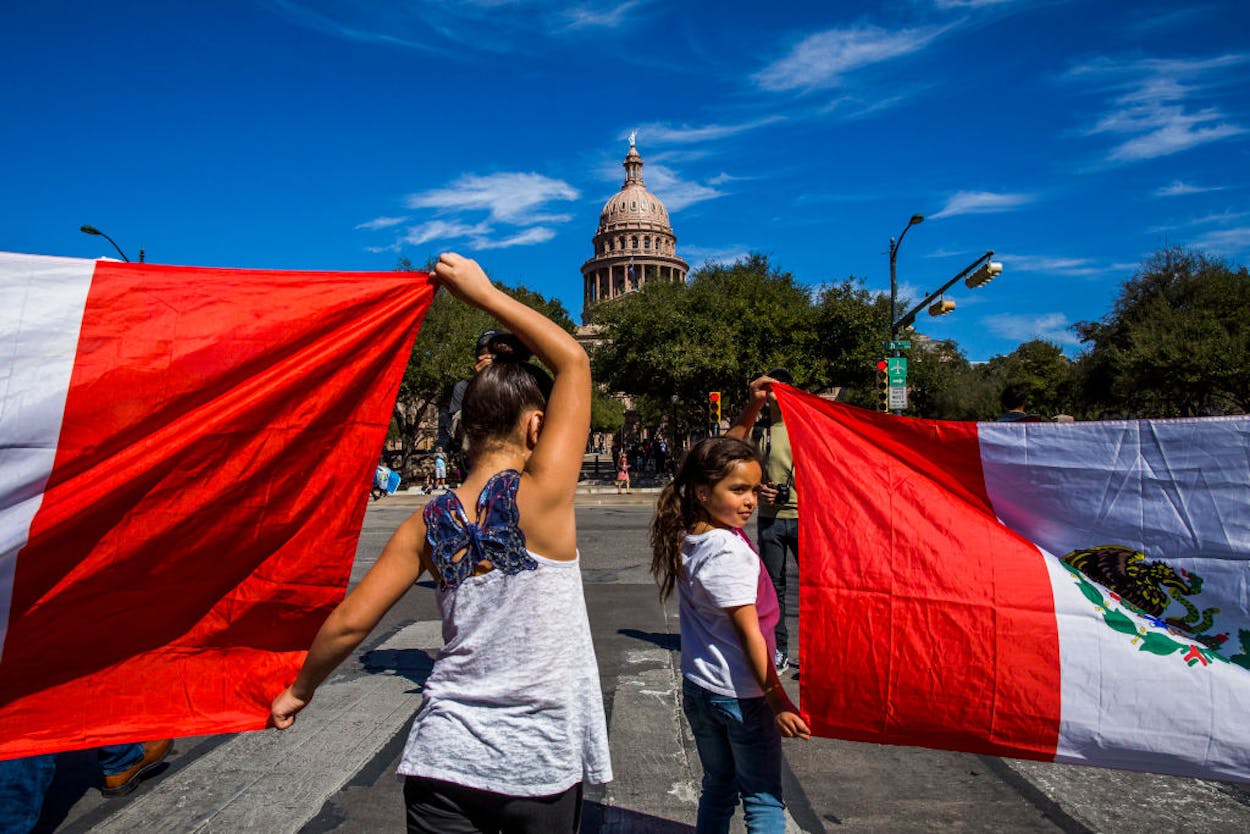Amid the looming threat of losing federal funding, sanctuary cities are fighting back against President Donald Trump’s executive order that targets immigrant friendly cities and counties. Texas has a dog in the fight: On Tuesday, Travis County commissioners voted 4-1 to sign an amicus brief in support of a lawsuit filed in January by the city and county of San Francisco. The city of Austin soon followed in supporting the brief. The lawsuit challenges the constitutionality of Trump’s January 25 executive order, which will cut some federal money from local jurisdictions that don’t fully cooperate with U.S. immigration enforcement agencies.
“We agree with the position of San Francisco that the administration’s position is a violation of the U.S. Constitution’s Tenth Amendment federalist revision,” Travis County Judge Sarah Eckhardt said, according to the Austin American-Statesman, referring to the part of the Bill of Rights which establishes federal and state powers. The order violates “a basic tenet of our governmental structure,” Eckhardt told the Austin Monitor. “It’s forcing local authorities to do federal work.”
The sanctuary policy recently implemented by Travis County Sheriff Sally Hernandez has already drawn the ire of Governor Greg Abbott, who cut more than $1 million in state funds from the county last month. U.S. Immigration and Customs Enforcement, meanwhile, targeted the area in a series of raids in early February. Despite the pressure, Travis County does not appear ready to relent—perhaps, in part, because it’s not alone in the fight.
A total of 36 counties and cities signed the amicus brief, including 18 in California alone. A wide range of cities added their signatures to the brief, including Los Angeles, Chicago, Denver, New Orleans, Salt Lake, Minneapolis, and Sante Fe. Austin also signed an amicus brief in support of a similar lawsuit filed by the California county of Santa Clara earlier this month (Travis County missed the deadline on that one). The filing of the brief comes on the heels of the Trump administration doubling down on its promise to punish immigrant sanctuaries. On Monday, Attorney General Jeff Sessions cautioned sanctuary cities to “consider carefully the harm they are doing to their citizens by refusing to enforce our immigration laws, and to rethink these policies,” according to the Washington Post. “Such policies cannot continue. They make our nation less safe by putting dangerous criminals back on our streets.”
According to recently released federal data, Travis County led the nation in refusing immigration detainers during the first week of February. But the sanctuary policy that kept these undocumented immigrants from being handed over to ICE did not also release them “back on our streets,” as Sessions insinuated such policies do. In an interview with NPR on Tuesday, Eckhardt pushed back against Sessions’s threat. “There’s been ample, ample studies that show that he doesn’t have a point,” she said. “The foreign-born don’t behave in criminal ways the same way the American-born do. People who are immigrants pretty much stay out of jail. We have a very safe community in Travis County… We have the lowest crime rate of any major metropolitan in Texas.”
Meanwhile, it’s still unclear how the feds even define a sanctuary city or county, which makes it hard on local jurisdictions to know whether their policies are overstepping any line that could cost them federal funding. On Wednesday, Austin Mayor Steve Adler and Dallas Mayor Mike Rawlings went to Washington, D.C., along with other local government leaders, to meet with Security Secretary John Kelly to discuss the increasingly contentious sanctuary city issue. Kelly told the group that he’s focused on getting rid of “bad guys,” a vague description that seems to lump convicted sex offenders in with people who have committed only minor offenses, single parents, spouses of military veterans, and law-abiding “model residents.”
“The lack of clarity is, ‘What is a criminal? What is a bad guy?'” Rawlings said after the meeting, according to the Dallas Morning News. Still, he seemed encouraged following the discussion. “I liked hearing what Secretary Kelly defined, in his mind, as rapists, murderers, child molesters—people that everybody doesn’t want living on their block, let alone their city or their country.” Mayor Adler, however, sounded less optimistic. “I do not believe the raids in Austin were directed and focused on removing bad people,” he told the Morning News. He also said the meeting did nothing to clarify the federal government’s definition of a sanctuary city, or when local governments could expect the administration to begin to take action against them.
Apparently Kelly did pretty much all of the talking during the meeting. According to the Statesman, not a lot of headway was made beyond simply establishing relationships and a line of communication. A DHS spokesman told the Morning News that the agency is still working on how to define sanctuary cities, and won’t be “stopping funding or restricting funding until we can get the definition down.” In the meantime, Austin and Travis County and dozens of other local governments across the country will continue to fight it out against the feds in court.






